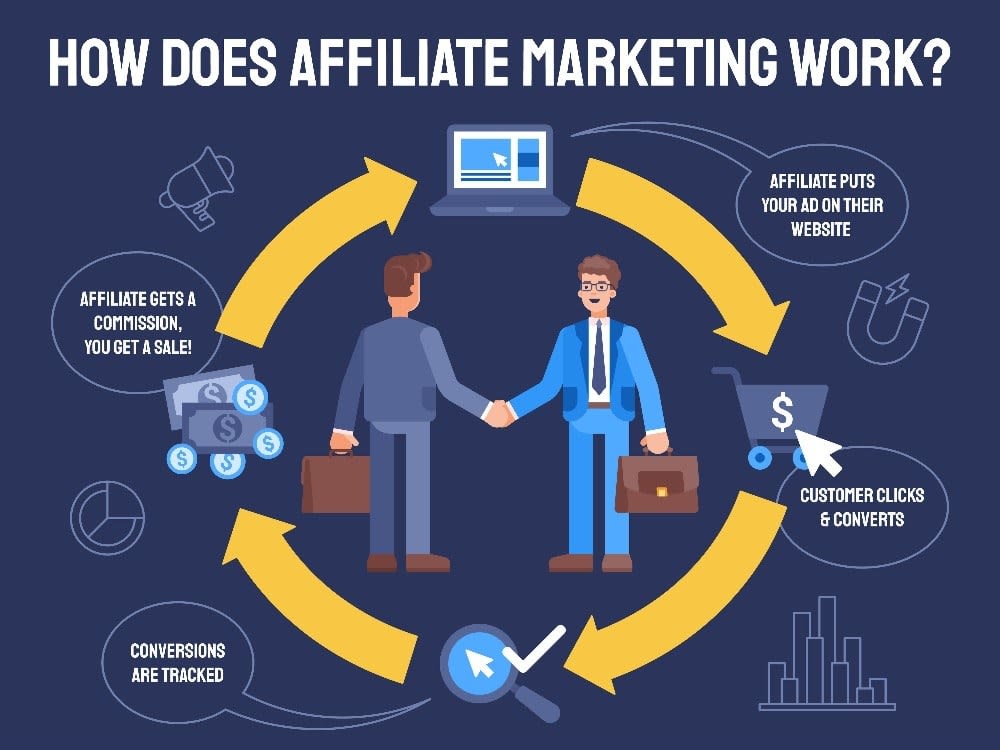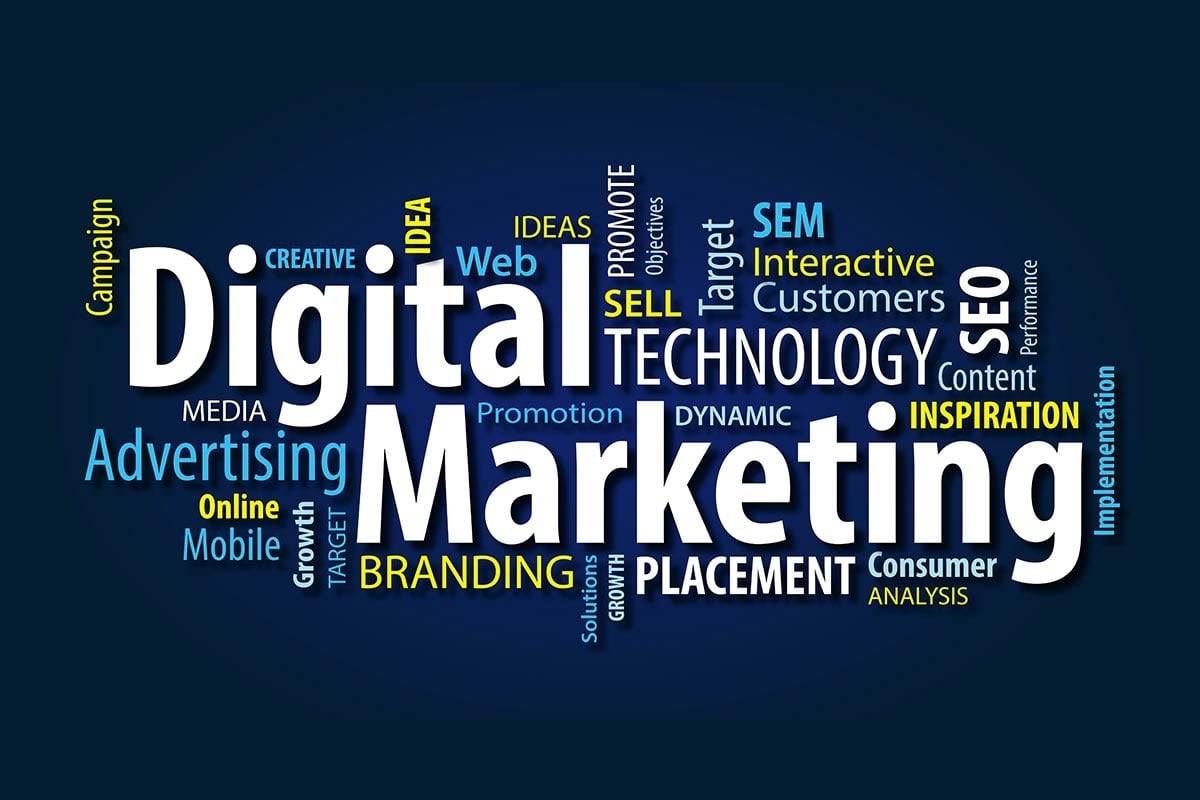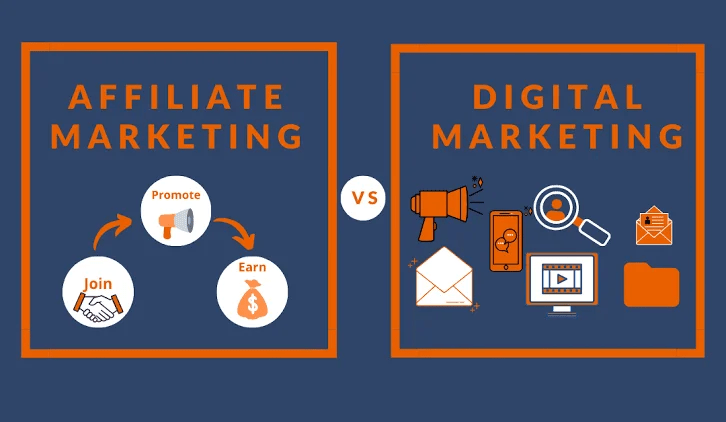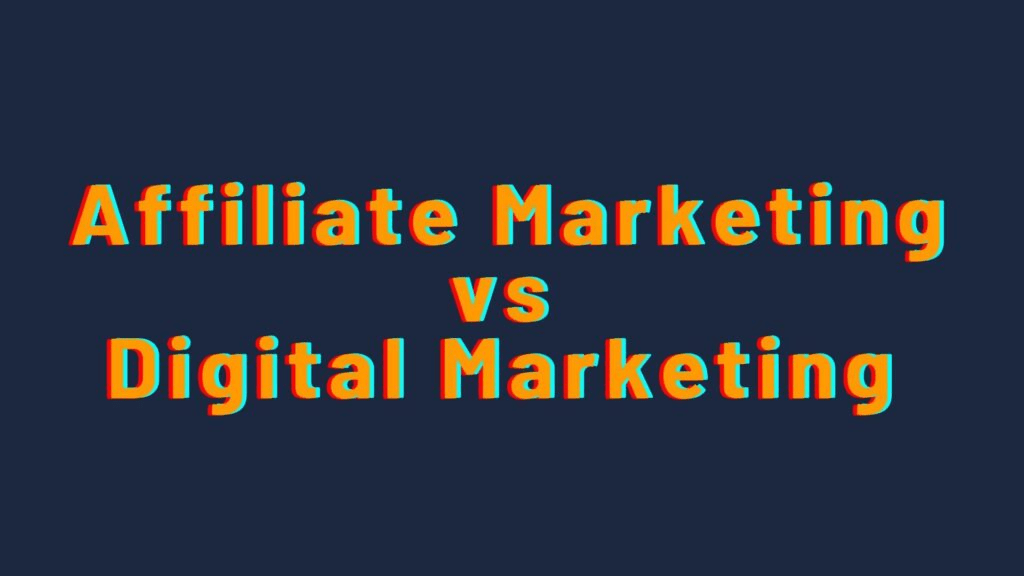Driving traffic to your online business is essential for achieving success in affiliate marketing, multi-level marketing (MLM), and other digital ventures. The right traffic can increase brand visibility, enhance sales, and fuel overall growth.
Affiliate Marketing vs Digital Marketing: What's the Difference and How to Leverage Them for Success
Affiliate Marketing vs Digital Marketing: What's the Difference and How to Leverage Them for Success
What is the difference between affiliate marketing and digital marketing? Inquiring minds want to know, so let's get to it. In today's digital age, marketing has evolved far beyond traditional advertising methods. The internet has provided businesses with a myriad of opportunities to reach their target audience and promote their products or services.
Two prominent strategies that have emerged in the digital marketing landscape are affiliate marketing and digital marketing. Although these terms are often used interchangeably, they refer to distinct concepts and approaches within online marketing. We'll dive into the definitions, success strategies, examples, and best practices of both affiliate marketing and digital marketing, providing a powerful comparison to help entrepreneurs make informed decisions on which strategy to use for online success.
What is Affiliate Marketing?
What is Affiliate Marketing?
Affiliate marketing is a performance-based marketing strategy where businesses reward affiliates (partners) for driving traffic or sales to their website through the affiliate's marketing efforts. In essence, it is a form of partnership where affiliates earn a commission for promoting a company's products or services. The process typically involves four key players:
Merchant (Advertiser): The business that sells the product or service.
Affiliate (Publisher): The individual or company that promotes the merchant's products in exchange for a commission.
Consumer: The end user who clicks on the affiliate's link and makes a purchase.
Affiliate Network: An intermediary platform that connects merchants with affiliates and manages tracking, reporting, and payments.
Success in affiliate marketing hinges on several factors, including selecting the right niche, building a strong online presence, and leveraging effective marketing tactics.
Here are some key steps to achieve success:
Choose a Profitable Niche: Identify a niche that aligns with your interests and has a demand in the market. Conduct thorough research to understand the competition and potential profitability.
Select the Right Affiliate Programs: Do your best to partner with reputable merchants that offer high-quality products and competitive commission rates. Consider joining established affiliate networks to access a wide range of programs.
Create Valuable and Engaging Content: Develop high-quality, informative, and engaging content that resonates with your target audience. This could include blog posts, reviews, tutorials, videos, and social media content.
Build a Strong Online Presence: Establish a professional website or blog and optimize it for search engines (SEO) to attract organic traffic. Utilize social media platforms to expand your reach and engage with your audience.
Leverage Email Marketing: Build an email list and use it to nurture relationships with your subscribers. Send personalized and relevant offers to drive conversions.
Analyze and Optimize: Continuously monitor your performance using analytics tools. Identify what works and what doesn't, and make data-driven adjustments to improve your strategies.
Now that we've discussed affiliate marketing a little, let's discuss a few examples.
Amazon Associates: One of the largest and most popular affiliate programs, allowing affiliates to promote millions of products and earn commissions on sales.
ShareASale: A well-known affiliate network that connects affiliates with various merchants offering diverse products and services.
ClickBank: A digital marketplace specializing in digital products like e-books, software, and online courses, with high commission rates for affiliates.
What is Digital Marketing
What is Digital Marketing
Digital marketing encompasses a broad range of online marketing activities aimed at promoting products or services through digital channels. Unlike affiliate marketing, digital marketing is a comprehensive approach that includes various strategies and tactics to achieve different marketing objectives. Key components of digital marketing include:
Search Engine Optimization (SEO): The process of optimizing a website to rank higher in search engine results pages (SERPs) and attract organic traffic.
Content Marketing: Creating and distributing valuable, relevant, and consistent content to attract and engage a target audience.
Social Media Marketing: Using social media platforms to promote products, engage with customers, and build brand awareness.
Email Marketing: Sending targeted and personalized emails to a segmented audience to nurture leads and drive conversions.
Pay-Per-Click (PPC) Advertising: Running paid ads on search engines, social media, and other platforms to drive traffic and generate leads.
Influencer Marketing: Collaborating with influencers to leverage their reach and credibility to promote products or services.
Affiliate Marketing: As mentioned earlier, it is a subset of digital marketing where businesses reward affiliates for driving traffic or sales.
Success in digital marketing requires a strategic approach, consistent effort, and adaptability. Here are some essential steps to achieve success:
Define Your Goals: Clearly outline your marketing objectives, whether it's increasing brand awareness, generating leads, driving sales, or improving customer engagement.
Know Your Audience: Conduct thorough market research to understand your target audience's demographics, preferences, and behaviors. Create detailed buyer personas to tailor your marketing efforts effectively.
Develop a Comprehensive Strategy: Create an integrated digital marketing plan that encompasses various channels and tactics. Ensure your strategy aligns with your goals and audience preferences.
Optimize for SEO: Invest in SEO to improve your website's visibility and attract organic traffic. Focus on keyword research, on-page optimization, and building high-quality backlinks.
Create High-Quality Content: Produce valuable and relevant content that addresses your audience's pain points and interests. Utilize different formats like blog posts, videos, infographics, and podcasts.
Leverage Social Media: Build a strong presence on social media platforms where your audience is active. Engage with your followers, share valuable content, and run targeted ad campaigns.
Utilize Email Marketing: Segment your email list and send personalized and relevant emails to nurture leads and drive conversions. Use automation tools to streamline your email campaigns.
Monitor and Analyze: Regularly track your performance using analytics tools. Measure key metrics like website traffic, conversion rates, and ROI. Use insights to refine your strategies and improve results.
Coca-Cola's Share a Coke Campaign: A successful social media campaign where Coca-Cola printed popular names on their bottles, encouraging customers to share photos and stories on social media.
HubSpot's Inbound Marketing Strategy: HubSpot uses content marketing, SEO, and email marketing to attract, engage, and delight customers, establishing themselves as a leader in inbound marketing.
Nike's Social Media Campaigns: Nike effectively uses social media platforms like Instagram and Twitter to promote their products, engage with their audience, and build brand loyalty.
Affiliate Marketing vs. Digital Marketing: A Comparison
Affiliate Marketing vs. Digital Marketing: A Comparison
Affiliate Marketing: Focuses primarily on performance-based partnerships where affiliates promote products and earn commissions. It is a subset of digital marketing with a narrower scope.
Digital Marketing: Encompasses a wide range of online marketing activities, including SEO, content marketing, social media marketing, email marketing, and more. It is a broader and more comprehensive approach.
Affiliate Marketing: The primary goal is to drive traffic and generate sales through affiliate promotions. Success is measured by the number of conversions and the commission earned.
Digital Marketing: Goals can vary widely, including brand awareness, lead generation, customer engagement, and sales. Success is measured through various metrics like website traffic, conversion rates, and ROI.
Affiliate Marketing: Relies on affiliate partnerships, content creation, and promotional efforts by affiliates. Key tactics include product reviews, comparison articles, and targeted email campaigns.
Digital Marketing: Utilizes a diverse set of strategies and tactics, including SEO, content creation, social media engagement, paid advertising, email marketing, and influencer collaborations.
Affiliate Marketing: Merchants have limited control over how affiliates promote their products. Affiliates have the flexibility to choose their promotional methods.
Digital Marketing: Businesses have full control over their marketing strategies and can tailor their campaigns to align with their brand image and goals.
Affiliate Marketing: Typically involves low upfront costs for businesses, as affiliates are paid based on performance. Affiliates may incur costs for content creation and promotional activities.
Digital Marketing: Requires investment in various channels and tools, such as SEO, PPC advertising, content creation, and social media management. Costs can vary depending on the scale and complexity of the campaigns.
Understanding Affiliate Marketing and Digital Marketing
Understanding Affiliate Marketing and Digital Marketing
Despite popular belief, both affiliate marketing and digital marketing play important roles in the modern marketing world. While affiliate marketing offers a performance-based approach that allows businesses to leverage the promotional efforts of affiliates to drive traffic and sales, digital marketing encompasses a wide array of strategies and tactics that enable businesses to achieve diverse marketing objectives.
Success in affiliate marketing requires selecting the right niche, partnering with reputable merchants, creating valuable content, and building a strong online presence. In contrast, success in digital marketing necessitates a comprehensive strategy, understanding the target audience, optimizing for SEO, creating high-quality content, leveraging social media, and continuously monitoring performance.
Ultimately, the choice between affiliate marketing and digital marketing depends on a business's goals, resources, and preferences. Many businesses find that integrating both approaches can yield the best results, leveraging the strengths of each to achieve their marketing objectives. By understanding the nuances of affiliate marketing and digital marketing, businesses can make informed decisions and craft effective strategies to thrive in the digital age.
If you're looking to build a wildly successful online business, consider my top pick!
Ellard "Coach Ell" Thomas has over 20 years of experience in coaching entrepreneurs and hardworking people to achieve their income and organizational goals. He is not just a trainer, but a mentor and a friend who genuinely cares about the success and well-being of his students and clients. He has a wealth of knowledge and expertise in financial literacy, business strategies, and personal development, which he shares generously and enthusiastically. Coach Ell is set apart by his knowledge, unwavering commitment, and desire to see people live their best, financially free lives. He inspires and empowers people to overcome their challenges, pursue their dreams, and create a positive impact in the world.
Leave a Comment 👋
Leave a Comment 👋
Want to Make More Money?
Want to Make More Money?
Learn How To Launch Your Own Wildly Profitable Affiliate Marketing Business In Just 7 Days.
Learn How To Launch Your Own Wildly Profitable Affiliate Marketing Business In Just 7 Days.
Similar Posts
Similar Posts
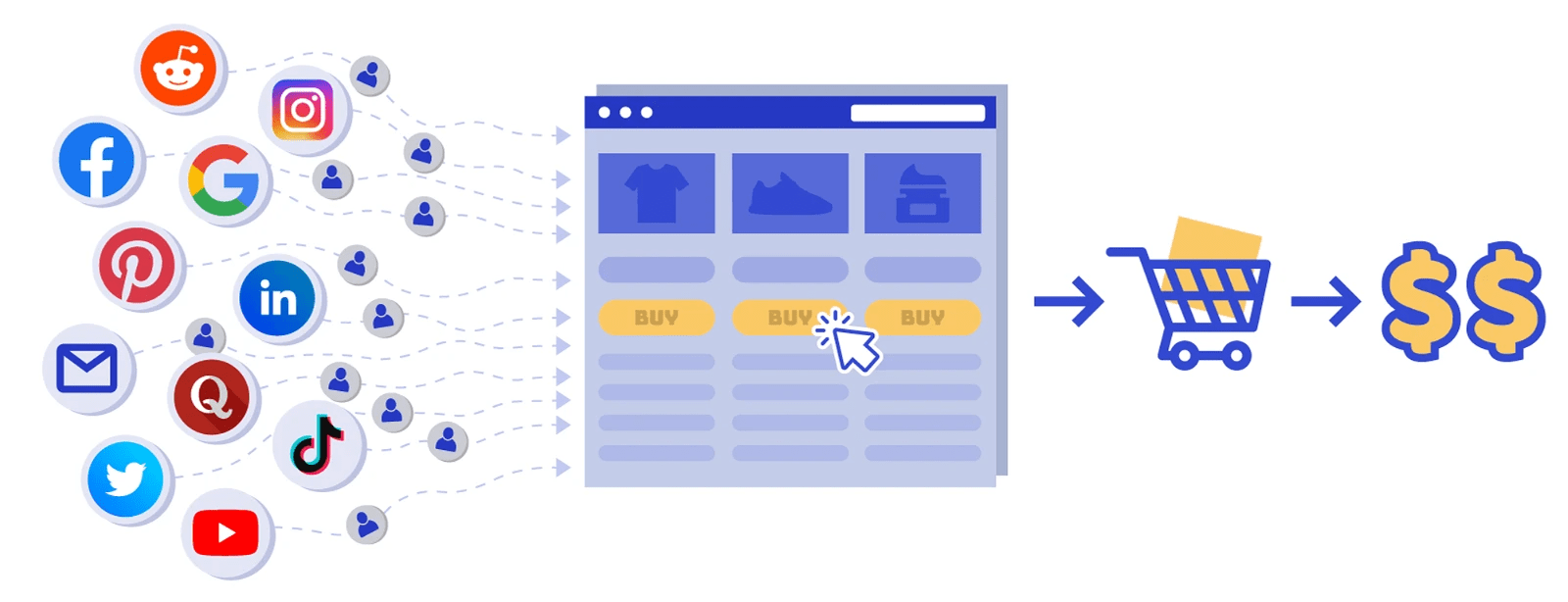
The Best Ways to Get Traffic for Affiliate Marketing, MLM, and Online Businesses

7 Best Traffic Sources for Affiliate Marketing: How to Use Them, Pros and Cons, and Why They Work
Affiliate marketing can be a lucrative way to earn income by promoting products or services and earning commissions on sales. The key to success in this field is driving targeted traffic to your affiliate links. Here, we explore seven of the best traffic sources for affiliate marketing, providing insights into how they work, their advantages and disadvantages, and why they're effective.
Want to Make More Money?
Want to Make More Money?
Learn How To Launch Your Own Wildly Affiliate Marketing Business In Just 7 Days.
Learn How To Launch Your Own Wildly Affiliate Marketing Business In Just 7 Days.

